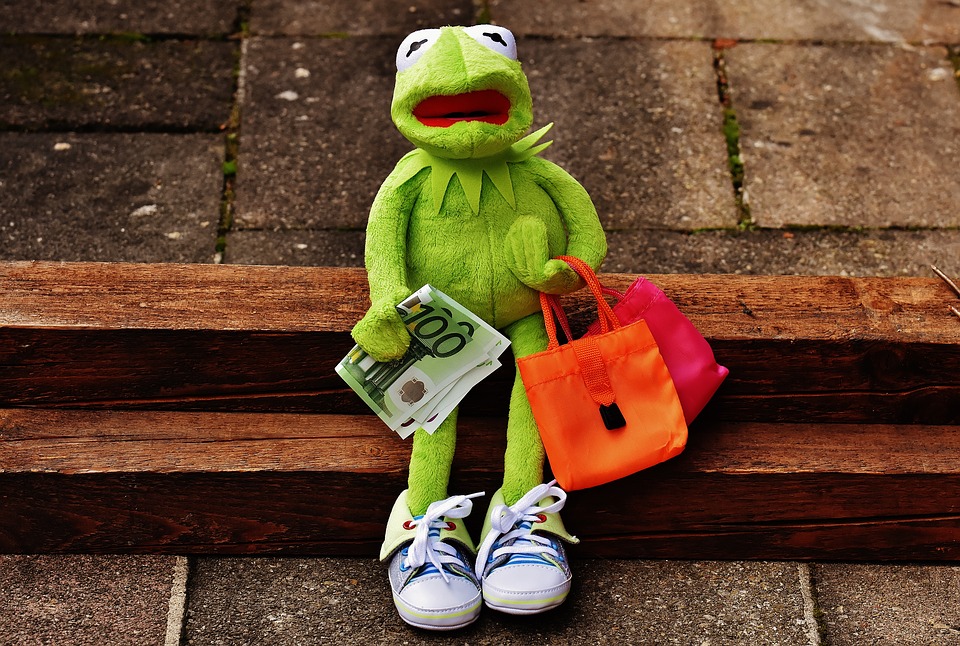
10 Strategies to help you stop getting more stuff when you are trying to declutter
In a nutshell – Are you bringing more into your home than you are decluttering out? These tips can help you stop getting more stuff you don’t need.
It’s far too easy to use shopping as a way to relax and get away from it all. I get a real adrenalin rush when I see something I really want. My heart flutters and I feel a sense of urgency to spend, quickly, before that feeling goes. I’m even tempted by stuff that is sub standard. Making do with things that are not quite right, or really bad copies of something I actually do covet does not make me feel good. Since I like the thrill of the shopping chase I needed to find some ways to control it. These anti shopping strategies help me without making me feel I’m denying myself any fun.

1. Avoid adverts
Adverts make me feel like a failure. My hair will never be glossy enough, my body never thin enough and my house never that clean. Unless I Photoshop myself into looking amazing, which is what the adverts actually do, I will never look like an advert. Adverts are not real life. Real life is hair that goes frizzy somewhere and the occasional cat puke on the door mat, you tend not to see that in adverts.
Strategy 1
Install adblockers on computers and stop buying magazines to avoid adverts.
2. Only buy useful things
You can cut out a lot of temptation to shop if you only buy things that have a purpose. Will it make life easier in some way? If not, then why do you need it? Requesting useful things for presents has made my re-gifting stash much smaller too.
Strategy 2
Do not buy it unless it is so useful it will make your life easier.
3. Only buy beautiful things
If you are very tempted to buy something useless ask yourself if you think it is a beautiful thing. Beauty is subjective, one persons ugly can be another persons gorgeous, so this will be personal to you alone. You can use a personal rating system though. On a scale of 1 to 10, where 10 means you need to swap this new thing for 10 old things, how beautiful is it?
Strategy 3
Only buy it if it is so beautiful you would happily get rid of 10 other things to have it.
4. Know that boring shopping can lead to treat shopping
Shopping for day-to-day stuff can be a pretty dull experience. It can be very tempting to treat yourself with a little something as a reward for enduring it. Big supermarkets have huge rows of little ornaments and ‘handy’ kitchen gadgets because they want you to spend that little bit extra. They know boredom is a big trigger to spending. Even though I know this I can still be tempted by buying something little for my son, who won’t need or really want it.
The little conversation with myself in my head goes a bit like this:
“I’ve been a good adult today and done the shopping.
Look, I even bought floor cleaner.
What a totally unglamorous life I lead.
I deserve a treat.
Something frivolous but not expensive.
Maybe there is something cheering in the reduced section.
Ooooh, that is a nice colour.
But I have a rule that all things in my home should be useful or beautiful.
I could use it to put something in, there must be something that fits in there.
Or I could buy that shiny thing and use it as a book end.
I don’t need a book end.
But maybe my sister does…….”
Strategy 4
Remember that shops are set up to trap you into spending. Avoid the areas with the pretty shiny things.
5. Bargains are not bargains
Two for the price of one is only a bargain if you were going to buy one anyway AND you will be able to use 2 of them. Beware of getting sucked into the idea that a bargain is a good thing. Saving £50 on a £100 handbag that you were not intending to buy still means you have spent £50. Inventory the things you have at home before you get sucked into getting more, you can do this really quickly buy taking phone photos of your cleaning products to refer to when you shop.
Strategy 5
Take a shopping list. Keep photos on your phone of what you have at home to remind you that you do not need more.
6. Treat yourself with experiences and consumables
Rewards are good, it’s nice to feel like you are treating yourself but this does not have to be with stuff. Spend money on meals out, cinema tickets, the theatre, massages or food and drink. There is credible research that strongly suggests that spending money on experiences makes us happier than buying things.
Strategy 6
Have a coffee or buy some bath stuff instead of buying physical things
7. Have rules
Give yourself some boundaries. If you have to go shopping take just enough cash for what you need. Stick to shopping lists. Leave your debit and credit cards at home. Just say no!
Strategy 7
Stick to your shopping rules. Take limited cash and a shopping list.
8. If you get something new get rid of something old
By ‘new’ I mean new to you, this includes charity shop bargains as well as brand new things. If you get a new book, get rid of an old one you don’t want any more. Better still, get rid of 2 books you no longer need. Aim to take more things out of your house than you bring in.
Strategy 8
Before you buy a new thing, decide what old thing it will replace.
9. Think of things as temporary guests
So you couldn’t resist a bargain and now you have a complete set of indoor garden gnomes, all dressed in tutus. They looked great in the shop and you find them funny and you like them. That is all ok. But it is also ok to not like them forever. These are things, just things, you don’t need to be faithful to them. There is no marriage contract with things.
Strategy 9
Buy new things with the idea of them being just for a season or a short time before you donate them.
10. Have regular buy nothing days
There is an actual Buy Nothing Day and it is generally worldwide in September. People celebrate quietly at home by spending nothing or if you prefer you can join in with many different things all over the world. In Bristol it often coincides with the Zombie Walk, where people roam the streets, gormlessly and vaguely looking for brains. Just like me shopping for clothes on a normal day 🙂
Strategy 10
Have occasional days where you buy nothing at all.
New for me can mean second-hand so these strategies apply at car boot sales, charity shops and jumble sales. They also apply to markets, supermarkets, high street shops, antique fairs and even stuff that is being given away.
10 Strategies to stop buying more stuff.
- Install adblockers on computers and stop buying magazines to avoid adverts.
- Do not buy it unless it is so useful it will make your life easier.
- Only buy it if it is so beautiful you would happily get rid of 10 other things to have it.
- Remember that shops are set up to trap you into spending. Avoid the areas with the pretty shiny things.
- Take a shopping list. Keep photos on your phone of what you have at home to remind you that you do not need more.
- Have a coffee or buy some bath stuff instead of buying physical things
- Stick to your shopping rules. Take limited cash and a shopping list.
- Before you buy a new thing, decide what old thing it will replace.
- Buy new things with the idea of them being just for a season or a short time before you donate them.
- Have occasional days where you buy nothing at all.
